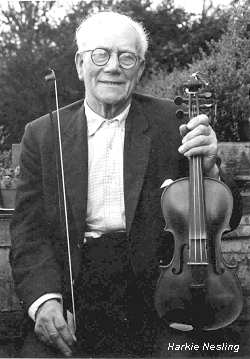 I can remember when I was small my grandmother singing to us. She sang and played the piano - she'd sing that one The Dark Girl Dressed in Blue. She used to sing some lovely songs, really old ones too - well, she was over 50 when I first heard her so that'll tell you. My first instrument was a concertina. I got it when I was only about five or six. My dad's boss had a brother called Sidney Curtis, a crippled chap. He had two or three concertinas and he knew I liked music, so one morning I got up to go down the bottom of the garden to have a wee y'know, and when I came back I was this box on the doorstep. I was real pleased with that. It weren't an English concertina, no, a German one. After that I mucked about on a 5-string banjo and a mandolin but never on an accordeon - I preferred string instruments.
I can remember when I was small my grandmother singing to us. She sang and played the piano - she'd sing that one The Dark Girl Dressed in Blue. She used to sing some lovely songs, really old ones too - well, she was over 50 when I first heard her so that'll tell you. My first instrument was a concertina. I got it when I was only about five or six. My dad's boss had a brother called Sidney Curtis, a crippled chap. He had two or three concertinas and he knew I liked music, so one morning I got up to go down the bottom of the garden to have a wee y'know, and when I came back I was this box on the doorstep. I was real pleased with that. It weren't an English concertina, no, a German one. After that I mucked about on a 5-string banjo and a mandolin but never on an accordeon - I preferred string instruments.
I didn't get on on the violin till I was about 14 just after I left school. There was this old chap called Billy Smith, a packman, he played an English concertina in the pubs. It had all glass keys and sounded beautiful. Well, he used to give fiddle lessons - there were about four or five of us used to go to Bedfield chapel and he'd teach us the violin. He wasn't a great fiddler himself, not as good as he was on the concertina, but he was a good teacher none the more for that; but it was slow going 'cos I didn't have my own fiddle.
When I was about 16 I used to knock around with a lad called Walter Gyford, from my village. He was a bit older than me and we'd sometimes go round the pubs together, although I was a bit young then. I was working as a wheelwright then until it died out, and you had to work from six in the morning till six at night, so it was only on Saturdays that you had much chance to go out anywhere - because you finished at half-past-four then! Well, one Saturday night we walked into Framlingham, about seven miles - no buses or cars then - and we went into a pub called the Queen - it's been closed for years now - and there was this chap playing the violin. He was a fairly old man, gypsy boy, with an old red neckerchief and about five days growth of whiskers on this chin, and he was sitting on this high settle rattling out some old tune or other. So I said to Walter - he was learning fiddle with me at that time - "How would you like to buy that fiddle?" "He won't part me that" he says. "Well, let's see" I said. So I found out his name and he was a man called Billy Harris from Charsfield (cf Jimmy Knights) so I said "Hello Mr Harris, I see your mug's nearly out, can I get you a drink?" So I bought him two or three pints and I put a drop of gin in them, and he he bought us a couple back. I said "Do you mind if I have a go on that violin?" "No dear boy, you have a crack." So I played two or three tunes and the pub filled up a bit and everyone was dancing. "Well, you can do that job all right" says Billy.
"How would you like to sell us that violin, Mr Harris?" I said, "I'll give you twelve bob for it". "No, I can't do that boy" he says "that's a damn good fiddle". Well, I could see he was short of tin what with buying us beer so I kept on at him. "Well, all right, I could sell you it" he says, "but I can't let you have the bow". "Well, that's no good without the bow" I said, and after a bit of persuasion we got the bow as well for another bob, and got out the pub pretty smartish in case he changed his mind.
Well, when we got home Walter looks at this fiddle and it's all held together with stout and string. "I can't take this home, it reeks of beer" he said, "my mother'll go barmy!" So I took it home and left it hanging in the shed for about six weeks all done up in brown paper, but once we'd cleaned it up it was a damn good fiddle. Walter played it for years, and the last I heard, he'd handed it on to his nephew Walter Clow.
Not long after that I left Suffolk and moved to London to work as a wheelwright. My sister Phyllis lived there and she used to sing at clubs and on the music hall with her husband Harry Baldock who played violin. So at nights I got a job playing at the Holloway Empire, in the pits for silent movies. There was one chap playing the organ, one on cornet and me and another fellow playing the violin. It was a good laugh but we didn't have any time for practising and it was dark in those pits so you couldn't read the music - blimey, we got into some right muddles now and then.
I was 22 then, but I had a bad accident at work. I was in Whitechapel Hospital for three months and when I came out I went back to Suffolk to marry. From then on I really got interested in music 'cos I was self-employed then. We formed a little band then. There was me and Walter and a blind chap (also from Bedfield) called Walter Read - two fiddles and accordeon. We used to practise every Friday night in Bedfield Hut. Sometimes another chap would join in on piccolo, and kids used to come and listen and you'd find them fast asleep about midnight when we were packing up. At weekends we used to play a lot for weddings and dances in schools or chapels or just in pubs like Monk Soham Elm and Bedfield Crown and Framlingham - that was a good place for music.
We played all old country tunes - polkas, waltzes, hornpipes. Walter Read was a master of step-dance music. And on Sundays I played in the band in Monk Soham church with Tom Chapple (violin) and his wife - she played organ and piano lovely. Every Christmas I'd walk to Earl Soham with a couple of mates and play carols in the pubs - we used to get back home about five in the morning with two or three quid in our pockets; and in August our band was always at the Galas - Debenham on Monday, Framlingham on Tuesday and Dennington on Wednesday, one after the other. We had some damn good times then. We played for years together until about 1940 when Sam Gyford's band took over from us, but I've still got four fiddles and play a bit around here with Pip. Music's always been my hobby and always will be.
(Harkie's long musical career and close association with some great musicians has meant that his powers are still strong today. He still plays a good selection of polkas such as The Sultan's Polka (a local favourite), waltzes and schottisches and in addtion has a large repertoire of unusual popular songs, many of which he picked up from organ-grinders and sheet-music sellers in London. A lot of these songs he accompanies with his violin, both bowed normally or plucked in mandolin style. ![]() Although he seldom leaves home nowadays owing to bad arthritis in his leg, he is still well remembered by many local people and has also appeared on Anglia TV's "Bygones" singing Won't you be my Little Teddy Bear (sound clip). A totally delightful character.)
Although he seldom leaves home nowadays owing to bad arthritis in his leg, he is still well remembered by many local people and has also appeared on Anglia TV's "Bygones" singing Won't you be my Little Teddy Bear (sound clip). A totally delightful character.)
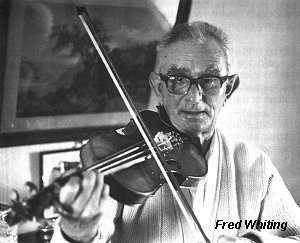 Fred then borrowed one of the four fiddles hanging over Harkie's mantlepiece and began a series of recordings which has lasted over three years and produced abut 100 hornpipes, polkas, schottisches, jigs and waltzes, and Fred recently told me that his current project is to put down on his cassette recorder all the old country songs he knows!
Fred then borrowed one of the four fiddles hanging over Harkie's mantlepiece and began a series of recordings which has lasted over three years and produced abut 100 hornpipes, polkas, schottisches, jigs and waltzes, and Fred recently told me that his current project is to put down on his cassette recorder all the old country songs he knows!
My father, John Whiting, wasn't a musician but he knew a hell of a lot of old songs. He was a shepherd and when they were driving sheep round the country they'd often pull up at a pub for the night and have a sing-song and a dance. My mother died when I was only about quarter past five (Fred is now 72) so Dad had to look after us and I can remember him singing to me when he put us to bed. ![]() He'd sing The Ship that Never Returned or The Dark Eyed Sailor (sound clip) and I'd join in and when I stopped singing he knew that I was asleep.
He'd sing The Ship that Never Returned or The Dark Eyed Sailor (sound clip) and I'd join in and when I stopped singing he knew that I was asleep.
When I was a kid in Kenton I can remember there were about 60 kids used to go to Kenton School - well now they've had to close it - it dwindled down to about six. Well, that time of day I could have taken you to about seven mouthorgan players and maybe five or six fiddlers - just in a one-horse town like Kenton.
I tell you, it was a tough old place round here when I was young - you weren't dressed up properly for Sunday school unless you had at least one black eye and usually two if we met up with the Debenham kids - that was a rare place for scrapping. At gala times you had to be able to fight like Joe Louis or run like a greyhound and it helped if you could do both. And at election times - people took politics seriously then. The chap who kept the fish and chip shop was a staunch Conservative and he had this big poster up in his window. Well, you should have seen the rotten eggs and bricks fly through his window one night - right in the batter. There was no frying that night.
All the kids round here were bloody good with catapults - our dads encouraged us - you know, to fill the pot on Sunday with a rabbit or a pigeon. Well, there was me and a chap called Brooky Plant, and Joe Jolly. Daft buggers we were - we'd hold matchsticks up and shoot them out of each other's fingers, and I don't remember any of us ever getting hit - boy, I wouldn't do it now for all the rice in China. There was this old woman used to take in washing and we'd shoot at the pegs on the line - we didn't mean any harm but, crikey, we used to get a leathering when those sheets used to hit the mud.
I first started playing the mouthorgan when I was about 12. Brooky Plant had one and, boy, he was really hot on that. He was playing it all the time - so much so that he started geting a jittering on his jaw. My dad crazed me to stop: "You'll end up like Brooky" he'd say. Well, I didn't take any notice of that. But when I started work I was only earning seven bob a week and only a shilling of that was for myself. Well, they cost about 3/6d then and I was getting through about two a month and it wasn't long before I was financially paralysed. So I bought a tin whistle, then an old violin for thirty bob when I was 16.
I knew some people at Kenton - Tom Chapple and his wife who played, and I could see the advantage of playing by music, so I went away and bought Honeyman's Strathspey, Reel and Hornpipe Tutor and got the fingering positions and did a few little exercises, but I didn't know if I was doing it right or wrong until I came to a tune called The Bluebells of Scotland. Well, I didn't know it as that but as "Oh where, oh where, has my highland laddie gone", but as I played it through I recognised it and by crikey was I pleased 'cos I knew I was doing it right. Well, a lot of my tunes come from that book and from other people round here - Harkie taught me a lot from other people round here - Harkie taught me a lot of his polkas. ![]() My pet hornpipe is The Flowers of Edinburgh (sound clip) - I first heard that when I was about 12 on an old gramophone record by John McClusky, Scotland's champion melodeon player.
My pet hornpipe is The Flowers of Edinburgh (sound clip) - I first heard that when I was about 12 on an old gramophone record by John McClusky, Scotland's champion melodeon player.
In the '20s things got pretty tough round here; there was no dole or anyting. So a lot of the young lads went to Burton for the maltings, or joined the militia - and they always came back with a new pair of boots and little else. Well, in 1926 I decided to go to Australia. I was a bricklayer then and worked out there on the railway, building tunnels. I was out there eight years. I took my fiddle out there and in our camp were several Irish navvies - well I reckon two-thirds of Australians are of Irish descent; 3 or 4 of us had violins. And we were in one place where it rained for nine solid bloody months - we only had two fine days and eveything got saturated - blankets, clothes, even our matches we had to dip in wax before you could strike them. Well, all these other blokes, their fiddles came unstuck but mine was hung up in an old calico bag and it stuck it out all that while - whoever made that violin knew his job.
There were some good musicians over there. A guy called Harry Smith played the concertina and Jim Jackson the tin whistle, but the best music I heard, you'll think I'm daft, but it was out in the bush, were three or four old aborigines sitting in a circle blowing through old gum leaves - boy, you've never heard anything like it. I told you I used to play the tin whistle but I could only get about seven notes out of it. Well, I was coming down the road there one night when I heard this Jim Jackson playing Over the Waves and I rumbled what you could do with breath control - you could get far more notes notes out of it. So I got away on my own somewhere, so I wouldn't be nuisance, and I was playing Annie Laurie - getting on well with it - and a damned green-head ant crawled up my leg and give me such a bite, well, I played a note in Annie Laurie I reckon you could have heard back at Harkie's! Have you ever heard a parrot sing? I used to have one perched on my tent every morning and I taught it to whistle St Patrick's Day in the Morning. It was comical to hear it. If it went wrong it would stop and go through it again until it was right. So for six months I used to be woken up every morning with St Patrick's Day, and then I never saw it again. I reckon an old carpet snake got it.
I came back to Kenton in 1932 and soon got back into playing around the pubs round here - Rishangles Swan, Dennington Bell, Charsfield Horseshoes, Earl Soham Beerhouse - they were all good in their day, it just depended who kept it. We were taking some sheep down to Ipswich one Monday night and we stopped at Henley Cross Keys - my old granddad had told me they had a fiddle in there, so when we got our beer I asked the landlord if I could borrow it. Well, he didn't have one. "You're going back a few years boy" he said, but he got one from his daughter nearby and I played and the place soon filled up. Crikey, we had a ram-sammy that night - I ended up sleeping in a stook of wheat. Next time I was there I didn't have to ask - it came over the bar with our first pint.
Earl Soham used to be a lively place for music at one time. I've played in the Victoria - "Earl Soham Beerhouse" it was called because it could only sell beer; it wasn't fully licensed you see. There were so many people in there dancing that I had to play outside at the window. Fred Bloomfield kept it (Alec Bloomfield's uncle) - he was a decent old fellow - and that chap Alf Peachey would play his accordeon there. He was really good, and Stumpy Webber, an old bricky from Earl Soham, would step. We had some good nights there. 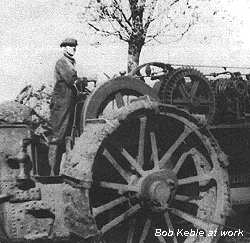 Peachey played in Ashfield Swan too. They had a wooden floor above the cellar and when they were dancing that floor went up and down so much it was a wonder it never caved in!
Peachey played in Ashfield Swan too. They had a wooden floor above the cellar and when they were dancing that floor went up and down so much it was a wonder it never caved in!
Another good place was Debenham. Bob Keble was the regular player on a Saturday night in the Woolpack and he always went round with a bloke called Jimmy Andrews who played a dancing doll I made for him - and he could do that job.
(Bob Keble, from Winston, was a very popular accordeon player locally. A big jolly chap, he was also an excellent singer of comic songs. Jack Chapman from Worlingworth, who used to keep a pub in Debenham and is no mean accordeon player himself, very kindly lent me a tape he made of Bob singing three songs: I've Never Seen a Straight Banana, In These Hard Times and an incredible song All Round Ipswich which is a local variant of a London music hall piece.)
The Mayor of Ipswich had a coachman, and his coachman's name was John.
His Worship to his coachman said "Take your wages and be gone."
Then John said to His Worship, "Sir, to show I can't be beat,
I'll drive you all round Ipswich and I won't go through a street."His Worship said "Man you must be mad but still I'll stand by you.
You know you'll lose your wages the very first street we go through."
So with His Worship in his carriage and John upon his seat,
They drove away from the Belstead Road which you all know isn't a street.They went down the Willoughby Road, the Station Road and along the Chantry Walk
Turned around up Portman Road and then down Portman Walk.
The went Aldeman Road, Hanford Road, London Road the same.
Turned to the left up Bramford Road and then down Bramford Lane.Bramford Lane down Richmond Road and the Norwich Road did go.
To the left up Anglesea Road and the Graham Road you know.
Now when they got to the Graham Road their old horses they stopped still.
They couldn't go down Paget Street so they turned up Constitution Hill.Constitution Hill they went along St Edmund's Drive.
Straightaway along the Henley Road and Love Lane by surprise.
When they got to the Henley Road, John said just for a lark,
"We can't get down through Bridle Way so we'll pop through Christchurch Park."Through Christchurch Park, down Bolton Lane, over St Margaret's Green.
Straight away up Woodbridge Road where the Golden Key is seen.
They went to Couldwell Road, Spring Road, St John's Road the same, And when they got as far as St Helen's Street they turned down old Grove Lane.Through the lane and away to Foxhall Road, that's the best road to pick.
"Dash my soul" His Worship said "John, I think you'll do it yet."
They went Derby Road, Salisbury Road, Felixtowe Road as well.
They stopped for a moment for John to think then turned down Bishop's Hill.Bishop's Hill down Myrtle Road and over the Hanson's Walk.
Rightaway onto the Commons Ways they stopped and had a talk.
From Commons Ways they went to St Peter's Way, Boundary Lane that's plain.
Straight over Stoke Bridge they went and then they took Bell Lane.From Bell Lane they came Bulstrode Lane in such a quiet mood.
John said to His Worship "Sir We're back on the Belstead Road."
His Worship said to John "Why, you've given me quite a treat.
You've driven me all round Ipswich Town and we've never been down a street."
Old Billy Harris, the one Harkie told you about, his grandson could step-dance - Alger Harris. I played for him in Charsfield Horseshoes just before I left for Down Under and, by crikey, he could hop. Now some will tell you that Stumpy Webber was the best dancer round here and I can understand that, but the king of them all for my money was an old man called Waddley Cracknell from Kenton. On a stone floor he was pretty to watch and pretty to listen to. He'd wear these old hobnail boots with heel irons and steel toe pipes and by hell he could clap it in.
I used to do a bit at one time. I'd play mouthorgan or fiddle and dance at the same time, but I wouldn't attempt it now. The best I've seen lately are Wattie Wright and Font Whatling when we went down the Swan the other week, and Charlie Whiting from Southolt. Now Charlie and Bill Whiting (he used to play melodeon in Cretingham Bell) and me - our grandads were three brothers.
(Fred virtually gave up playing about 20 years ago when he had a bad time with his eyes but fortunately he was cured at Ipswich Hospital and when he retired about five years ago became interested in playing again, especially on his visitis to Harkie. I sent him after our first meeting a couple of records of country music and this really did the trick. He practises quite a lot and is going through all his old tune books and polishing up. Most of his tunes come from sheet music, with a very high proportion of Scots and Irish hornpipes, but he still plays many of the old local tunes he learnt as a boy. ![]() Recently he has even started playing in the pubs again - often with Cecil Fitch, who plays a dancing doll (sound clip) - such as Worlingworth Swan, Brundish Crown, and even Blaxhall Ship. But as he says "Memory's a funny thing - if you ask me what I did last week I wouldn't know, but 50 years ago - it all comes back and I think a lot about those times.")
Recently he has even started playing in the pubs again - often with Cecil Fitch, who plays a dancing doll (sound clip) - such as Worlingworth Swan, Brundish Crown, and even Blaxhall Ship. But as he says "Memory's a funny thing - if you ask me what I did last week I wouldn't know, but 50 years ago - it all comes back and I think a lot about those times.")
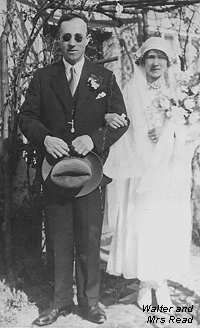 I have unwittngly started many an argument in pubs as to who was the better and honours are pretty evenly shared.
I have unwittngly started many an argument in pubs as to who was the better and honours are pretty evenly shared.
Much of the information I have on Walter Read was contained in letters from Mrs Mary Smith (nee Reed) of Dennington, to whom I offer grateful thanks.
He enlisted in the 4th Battalion Suffolk Regiment in November 1915 and served in France from 26 May 1916 to 4 November 1916 when he was blinded in the trenches at Le Flers, just in front of Bapaume. He was in the trench splitting up the lid of German bomb box to make a fire. In the lid however were some detonators. He was discharged in January 1917 and sent to St Dunstan's where he was trained as a shoe repairer and mat maker. He married Rose Crisp of Sweffling in the early '30s and had a daughter Margaret. Walter lived in Bedfield until 1955 when he moved to Little Thurrock, Essex, but returned in 1957 after St Dunstan's built a bungalow for him at Bedfield. Rose died in 1962 and Walter remarried in 1965 and lived at Bedfield with Marjorie until his death on February 26th 1971.
I have no idea where he learnt the accordeon; neither his mother or father were musical though his brother Arthur, my father, could play piano and an old banjo-mandolin, but only for his own pleasure at home, not for sing-songs in the pub like Walter. Walter could also play a little on the piano, mouthorgan and bones, but the accordeon was his best instrument - he could pick up tunes very quickly and was always in demand at weddings and parties. Another chap who was a friend of Walter over the years was the late George Scott of Saxstead who was also a good accordeon player but alas died suddently last year (1975). 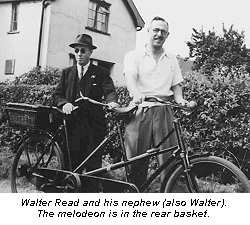 He was a great friend of Fred List and could have told you tales of years ago.
He was a great friend of Fred List and could have told you tales of years ago.
They used to have dances in the '30s on Saturday nights in Saxstead Chapel where the above three would play and a good time was usually had by all.
Walter also played with other people - I remember Font Whatling taking him round on a tandem and at one time Walter played in a band with Harkie Nesling and Walter Gyford, both from Bedfield. I remember a song my uncle and Harkie used to sing called Down in the Fields where the Buttercups all Grow. I don't know the words but I think it was a bit naughty. Walter Gyford used to sing Slap dab slap dab up and down the Brickwork. He was a very jolly short fat man, as I remember him, and I think I am right in saying his sister Martha married on the Clows in Hasketon - another very musical family.
Other pubs visited were Bedfield Dog, Monk Soham Oak, Worlingworth Crown and Saxstead Marlborough Head, now all closed. ![]() As Bedfield Crown was the nearest to home this was the place for a pint during the week. Then Saturday night if a friend came round they would get on the tandem, the accordeon in the basket, and go further afield. (sound clip - Walter Reed's Hornpipe - Dolly Curtis)
As Bedfield Crown was the nearest to home this was the place for a pint during the week. Then Saturday night if a friend came round they would get on the tandem, the accordeon in the basket, and go further afield. (sound clip - Walter Reed's Hornpipe - Dolly Curtis)
Another thing about Walter was the way he could remember people's voices and call them by name, even if they hadn't met for a long time. He was very independent and never let his blindness hinder him.
(Note: The man who used to keep Monk Soham Elm - unfortunately I do not know his name - told me that Walter could frequently be seen cycling around Bedfield on his own. He knew the area so well and could hear a car coming miles off. Also that he used to occasionally play darts in the pub. Someone would line him up and after a few practice darts and hearing how he had fared was quite good.)
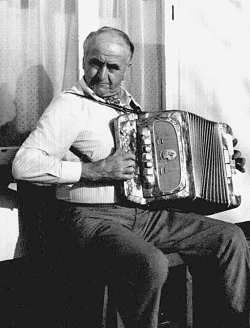 He was a tremendous player - you see him playing the Sailor's Hornpipe and he would use every button on the thing and never open it up more than a couple of inches. St Dunstan's offered to buy him a new accordeon and I helped him pick one out of a catalogue - beautiful job it was. I was about 19 then and Walter could hold his place in the queue with anyone, especially step-dance tunes. I used to go and pick him up in the evening - he'd make me laugh - he'd be sitting in his shed, singing and hammering away on a pair of shoes in the pitch dark. He was the happiest man I ever knew. We'd go to a lot of those old country pubs. I can remember one night in Bedfield Dog, I step-danced for 25 minutes, straight up, while Walter played. I was fairly fit then but the sweat was streaming down my neck at the end. Walter said "Font, I thought you would never stop boy." "Blast Walter" I said, "I was waiting for you!"
He was a tremendous player - you see him playing the Sailor's Hornpipe and he would use every button on the thing and never open it up more than a couple of inches. St Dunstan's offered to buy him a new accordeon and I helped him pick one out of a catalogue - beautiful job it was. I was about 19 then and Walter could hold his place in the queue with anyone, especially step-dance tunes. I used to go and pick him up in the evening - he'd make me laugh - he'd be sitting in his shed, singing and hammering away on a pair of shoes in the pitch dark. He was the happiest man I ever knew. We'd go to a lot of those old country pubs. I can remember one night in Bedfield Dog, I step-danced for 25 minutes, straight up, while Walter played. I was fairly fit then but the sweat was streaming down my neck at the end. Walter said "Font, I thought you would never stop boy." "Blast Walter" I said, "I was waiting for you!"
At that time there weren't many cars around here, but I had an old Austin Swallow - a beautiful thing it was (Font has worked as a driver all his life) and I'd normally start off in Worlingworth Swan and probably there'd be half-a-dozen of us chaps there would want to come out for the night. They'd craze me to go different places, so we'd all pile in and set off for some old pub. Well, it wouldn't be long before someone would say "Get on your old accordeon boy, give us a step." I used to play nearly every Friday, Saturday and Sunday. I shouldn't think there's many pubs round here I haven't played in.
I picked up a lot of my tunes from Walter, and an Irish navvy called Mick who lived at Southolt, and Dolly Curtis from Dennington - she's really good.
I was never taught to step-dance - it's just something that's in you - the rhythm sticks. People would ask me what tune I wanted for stepping. 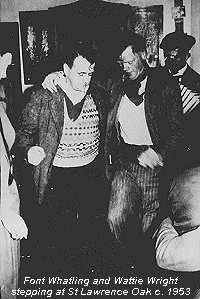 I said I didn't mind, you can play Abide With Me if you like, I'll dance to it. I used to ask the lady in the Beerhouse (Earl Soham) for an old beer tray and I'd dance on that - it used to make a hell of a din and by the time I handed it back the bloody thing would be battered to pieces. They used to hold step-dance contests outside pubs sometimes, just amateur things for the fun you know. I got second prize at Ubberton Wheatsheaf and they gave me first at Badingham Bowling Green - on the back of an old trailer.
I said I didn't mind, you can play Abide With Me if you like, I'll dance to it. I used to ask the lady in the Beerhouse (Earl Soham) for an old beer tray and I'd dance on that - it used to make a hell of a din and by the time I handed it back the bloody thing would be battered to pieces. They used to hold step-dance contests outside pubs sometimes, just amateur things for the fun you know. I got second prize at Ubberton Wheatsheaf and they gave me first at Badingham Bowling Green - on the back of an old trailer. ![]() Me and Wattie Wright would step-dance together - step for step. We'd put our arms round each other and when one of us wanted to stop he'd pinch the other in the ribs. That photo you've got is about the only time we got our steps mixed up.
Me and Wattie Wright would step-dance together - step for step. We'd put our arms round each other and when one of us wanted to stop he'd pinch the other in the ribs. That photo you've got is about the only time we got our steps mixed up.
(In the '50s Font formed a band called The Three Ws after its members: Eddie Woolnough (accordeon), Wattie Wright (drums) and Font (accordeon) and they played a lot for weddings and dances locally, besides playing Saturday nights regularly at Framsden Greyhound for five years. Nowadays Font plays less regularly but can still be heard on occasion at varous local pubs and at meetings of Dennington Pony and Trap Club of which he is an active member, taking a cup at the 1974 Suffolk Show. He also appeared briefly, step-dancing, in the film Akenfield. In addition to the unusual duet dancing with Wattie Wright, Font also has the amazing ability to step-dance while accompaning himself on the accordeon.)
Oh there were lots of good players round here those days - Smitty Plant, you know him - he plays with Oscar Woods and Peter Plant, his nephew, he plays a Club 2 and I've played with him. I used to have a Club 1. Well, on Peter's those five odd notes down there are semitones, and some tunes you get a very funny note, don't you, and you could pick one of those which you couldn't get on an ordinary accordeon. ![]()
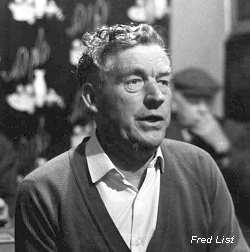 Dolly Curtis, she's another good payer. She used to play with Walter Read - well we both play that Johnson's Hornpipe (sound clip) - I think we both got it from Walter.
Dolly Curtis, she's another good payer. She used to play with Walter Read - well we both play that Johnson's Hornpipe (sound clip) - I think we both got it from Walter.
When I lived up at Saxstead they'd have a dance up at the Parish Rooms there on a Saturday night. Sixpenny Hops they were called 'cos it was a tanner to get in and my mum was on the door and she wouldn't let them in if they couldn't pay. She was a great big woman, much bigger than Dad, so they had to pay - they couldn't get round her! I know Walter played there a lot with George Scott. I'd generally go down the pub first and roll in the later part of the evening and probably give them a break. They'd have all sorts of old-fashioned dances - old country waltzes, barndances, polkas, Palais Glide.
Another chap who'd have made you laugh was Walter Gyford - he's dead now. He was some relation to the Clows and him and his brother Gordon, and Walter and Harkie would come up Saxstead Beerhouse and play. He'd play tin-whistle, accordeon, fiddle, or a set of bones or a dancing doll, and he'd sing comical songs - well he'd have made a cat laugh. Good old boy he was. (Walter Gyford died in Bedfield in 1975 aged 93.)
Now you talk about step-dancing, well I told you about my granddad, John List. I never saw him but there were several good ones round here. There used to be a little bloke, he'd dead now - I used to go to school with his children so you'd know. Well, if you saw him walk he used to throw his feet out all over the place, but you got him step-dancing and bringing them in, well he could wholly do that job. He lived at Saxstead near us - Tom Warne was his name. Stumpy Webber was another good one - he'd got one leg shorter than the other. He knew all these different kinds of steps. His two little feet used to keep going there - boy, it was pretty to watch - he'd make us laugh. We'd say "Go on, Stump, you have a go!" "I can't, you try" he'd say "my old knee won't go" and then he'd let two or three more have a crack because he fancied himself a bit at it and he'd like to show them how it was done, after they'd talked him into it!
Now, it's interesting to see the different styles of stepping. Some people like Charlie Whiting - he's very nimble on his feet - he's one of the best and he's got his own style. Others go all over the place, but what I went in for was the small foot dancing - you know, on a couple of bricks - then the second time you send your heel in, don't you? I learnt that style off Tom Warne. I never went in for contests like Font or Charlie but I know they had one at a social at Bedfield once - the one night I wasn't there. I know Walter Read played and I think a chap called Henry Jay from Saxstead won it.
Some of the best musicians I heard were some Irish chaps. They'd come over cutting sugar beet and get down Southolt Plough or Fram. Queen of a night. One of them played the fiddle, holding it across his arm. All sorts of tunes they'd play and dance. I picked up some of my jigs from them. That was about 1938 and these chaps were all about 50 then - scruffy old bunch but good company.
Well now, how I first got to play in Blaxhall Ship. I used to play in Farnham George quite a bit and Clopton Crown and one night me and my wife went to Ashe Buck (Campsea Ashe Running Buck, now closed), I think it was just before the War. Now that was a good old pub - you see it had three rooms - you had the bar, a little darts room and a big room where they used to get in with the music, so that we didn't interefere with the cards or darts. And this room was mostly full of Blaxhall people - Eli, Cyril, Percy Ling and all them, and a chap from Hasketon called Matton was playing and he knew I played so he gave me the accordeon and we had a good old time. Well, we had several good nights there and I got well in with these Blaxhall boys and they invited me down the Ship and I've played there off and on ever since.
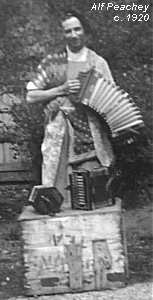 He had an old army valise for his box and those handkerchiefs, in the photo, he'd wrap up his accordeon in them, and you look at that thing now you'd think it was new though he had it over 40 years. Dad used to love Scottish music - Harry Lauder was his favourite - and Mum's still got all the old records Dad had - there must be 5 or 6 hundred of them.
He had an old army valise for his box and those handkerchiefs, in the photo, he'd wrap up his accordeon in them, and you look at that thing now you'd think it was new though he had it over 40 years. Dad used to love Scottish music - Harry Lauder was his favourite - and Mum's still got all the old records Dad had - there must be 5 or 6 hundred of them.
Mr R Kemp (a mate of Alf's and Walter Read's now living in Colchester):
Alf lived just out of Ashfield near Framsden. He was above medium height with sturdy build, a jovial red face and a large dimple in his chin. He smoked a long down-curving pipe and worked as a council roadman for 43 years. He was a jolly, jokey chap, always fond of his beer, and his haunts were mainly Ashfield Swan, Framsden Greyhound, sometimes one of the Debenham pubs (especially if there was a funfair on the Cherry Tree Meadow) and he was nearly always to be seen at Framlingham Gala on Whit Mondays. His repertoire included the Suffolk version of The Devil among the Tailors - a favourite among Suffolk accordeon players, and other similar reels and jigs like Rory O'More and The Irish Washerwoman, the old watz tunes of the '90s such as Daisy Daisy, In the Shade of the Old Apple Tree and so on. 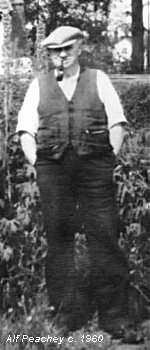 He was also a pretty fair singer of comic songs, and one in particular I remember was sung to Irish jig tempo called Mrs O'Rafferty and Mrs McGraw. Sometimes he would go what was then modern, and play tunes like The Man on the Flying Trapeze and Home on the Range. This was all done by ear since I don't think he ever learnt to read music.
He was also a pretty fair singer of comic songs, and one in particular I remember was sung to Irish jig tempo called Mrs O'Rafferty and Mrs McGraw. Sometimes he would go what was then modern, and play tunes like The Man on the Flying Trapeze and Home on the Range. This was all done by ear since I don't think he ever learnt to read music.
Dad played everything by ear but he'd know instantly if anyone was off key. He had a reed go in his accordeon and he took it to be repaired and they put a piano accordion reed in and he hardly every played it again - he thought people would know. Dad died about six years ago (1970). ![]() We'd been down the Swan and Dad played a while but I thought something was up because it was the first time I'd ever seen him stumped to finish his beer; and the next day he died. (sound clip - Three Jolly Postboys)
We'd been down the Swan and Dad played a while but I thought something was up because it was the first time I'd ever seen him stumped to finish his beer; and the next day he died. (sound clip - Three Jolly Postboys)
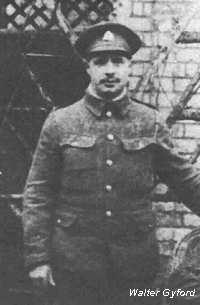 Well, you used to go in there and ask for someting and you'd never see such an uproar in your life - he'd hunt like hell for things and never find them. I went to a couple of lessons but I found them so boring. You'd start off on scales - that was OK, but then you ought to learn vibrato; but no, you couldn't do that, so there was no interest in it for me.
Well, you used to go in there and ask for someting and you'd never see such an uproar in your life - he'd hunt like hell for things and never find them. I went to a couple of lessons but I found them so boring. You'd start off on scales - that was OK, but then you ought to learn vibrato; but no, you couldn't do that, so there was no interest in it for me.
So my Uncle Walter let me have an old mandolin - that's how I got started on music. I was about 14 or 15 then and that's the first instrument I played in a dance band. We had a mandolin, banjo, piano and drums and we played at Bedingfield for a dance after a whist drive. We got four bob each for that job. After the mandolin I went on to a fiddle. I had a beauty - it cost £20 long before the War so you know it was a good one. I used to go round and play with Tom Chappell and his wife - she used to play piano nicely - and Pip (Fred Whiting), he'd come too with his fiddle sometimes. He had a little Pekinese with him, and Pip'd say "Show us how the sharks go in Sydney Harbour" and the little dog would bare his teeth and snarl. We all laughed.
Well, I thought I was pretty good on that fiddle until I heard a chap name of Bernard Burbinsky - he played classical music and came and played at a concert somewhere round here. My God, you talk about playing - I wouldn't touch a fiddle after that.
Then we started our band up regular in 1938 and stayed together for 19 years. We had Jack Snell (trumpet), Bob Jolly (mandolin banjo), Bob Chittock (drums), my wife Eve (piano) and I played mandolin. We used to play in Saxmundham Market Hall a lot - for cricket and tennis dances. We had little monkey jackets made up. That was during the War. The old tailor Mickey Ellis made them out of red hunting cloth, they cost us £8 each, and he said them button-holes will never fray and them buttons never fall off. And they didn't either - we've still got them.
As time went on I gave up the mandolin and violin because you didn't have any amplification or anything like that so it was a job to hear them. So I went on to saxophone - I got it off a soldier in Brandeston the day before D-Day. 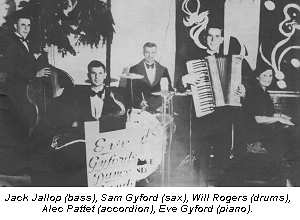 I used to go out with the audience and dance around with it when they had waltzes - I loved dance music. Harkie's son Ted - he joined us then and played accordion a lot in our band until he joined the army in 1944, and a young boy Alec Pattet took over. He was only about 16 - he's the butcher in Earl Soham now, and he could play chords lovely.
I used to go out with the audience and dance around with it when they had waltzes - I loved dance music. Harkie's son Ted - he joined us then and played accordion a lot in our band until he joined the army in 1944, and a young boy Alec Pattet took over. He was only about 16 - he's the butcher in Earl Soham now, and he could play chords lovely.
For two years just after the War we played every night of the week except Sunday. We started off as The Bandits, and oh we'd play at Southwold, St Lawrence, Bungay, Diss - the Old Corn Mill. That was the happiest time of my life. We were the most popular band round here but there were several other good ones: Punchard's from Cookly - I've danced to them many a time, the Earl Soham Band - John Ashwell (fiddle), Kenny Woods (piano accordion) and Ella Potter (piano). There was a young band run by the Halls in Fram., the Merrymakers from Fram. as well, and in Ipswich there were all sorts of bands at one time: Hawaiian Bands, accordion bands, dulcimer bands - Reg Porter run that - and the Mervyn Dale Band - they were a bit like us but had three or four saxophones. We went in for a band contest in Ipswich. We played Alexander's Ragtime Band for a quickstep and Tuxedo Junction as a foxtrot, and the waltz Varsovienne. About 12 bands went in for that and Harry Hayes, a beautiful alto player came up from London and judged it, - oh it was all in the Melody Maker. I don't remember who won but they were all professional.
We used to play for all those old-fashioned dances - waltzes, quicksteps, foxtrots, the Palais Glide,Veletas, Military Two-step, Lancers - you name them. For barndances we'd do Waiting at the Church or The Golden Hair was Hanging down her Back - that was old when I was a boy. Harkie sings that; and for polkas we'd have the Sultan's Polka - Pip can do that job. I was MC and sometimes me and Bob would harmonise on some songs. We didn't have a caller, but a Miss Woodward used to teach dancing and we'd play.
We played for a lot of Americans at the air bases like Horham. We were in the big hangar there one night and there was an air-raid on. Blow me if everyone didn't scarper and leave up playing. One occasion we were playing at Stradbroke and a Yank came up and asked me if he could sit in with us. Well, I looked at him - I didn't know what he was on about - sit in with us? When we found out he wanted to play we said "Sure" and he played a trumpet and was a beautiful singer. His name was Duane Long, a cook, and he played every night with us for ages and taught us a hell of a lot about chords and all that. Often when we played, a girl - we called her the Duchess of Kettleburgh - would dance. She was the best jitterbug dancer I've seen. Used to make some of the older people raise their eyebrows, but we loved it.
I didn't play in the pubs much - I'm not a great drinker - but Alec and me would sometimes go to Charsfield Horseshoes - just fiddle and accordeon. The Harrises were the leading lights there - good step-dancers. And at Melton Coach and Horses, we played with Billy Hall there - he was an old man then - and Blackie Thompson, a great accordeon player.
No, those years were the best of my life, and when I used to show at the Suffolk Show people would often come up and say they remembered dancing to our band at Horham or Saxmundham. I loved it.
Quotations in this chapter were from the following people:
| Performer | Recorded | Title | Record |
|---|---|---|---|
| Clifford Arbon (melodeon) | Monewden 1987 | K-K-K-K-Kiss me Again
The Egg Song Alf Peachey's Polka | VT 101 VT 106 VTVS 05/06 |
| Hubert Freeman | Beddingfield | Down in the Fields Where the Buttercups All Grow
I Finish Them Off | VT 106 |
| Bert Mays (melodeon) | Monk Soham 1985 | Untitled / Cock of the North / Pop Goes the Weasel | VTVS 05/06 |
| Harkie Nesling (fiddle) | Bedfield 1975-6 | The Sultan's Polka/Heel and Toe Polka/Won't You Be
My Little Teddy Bear/Impudence Schottische/ The Rakes of Mallow/The Barn Dance | Topic 12TS374 |
| Alf Peachey | Framsden 1960's | Blow Ye Winds/The Irish Family/Jolly Old Uncle Joe/
Proud of me Old Bald Head/The Poor Old Couple/ Goodbye Annie/Three Jolly Postboys. Diddling: Johnson's Hornpipe/Soldier's Joy | NL2 |
| Cecil Pearl (melodeon) | Claydon 1983-84 | Dick Iris's Hornpipe / Peachey's Polkas / Speed the Plough /
Woodland Flowers / Alf Peachey's March / Marlborough's March / Hornpipes / Polkas / La Russe Alf Peachey's Jig /The Rakes of Mallow / Charlie Rookyard's Polka | VT 130 VTVS 05/06 |
| Font Whatling (accordeon) | Worlingworth 1975-7 Stradbrooke 1991 | Mick's Tune/Pigeon on the Gate (with Wattie Wright
stepdancing)/Polkas/March/Stepdance Tune (with W Wright)/Pigeon on the Gate (with Font stepping) Untitled Polka/Golden Slippers/Mick's Tune Pigeon on the Gate (with Wattie Wright stepdancing) Abey My Boy/Story/Stepdance to Albert Hewitt's Hornpipe/ Various ensembles Untitled Tune/Kiss me Goodnight Sergeant Major/ When You're Smiling/Stepdance | Topic 12TS374 Topic TSCD659 Topic TSCD664 OH1 VTVS05/06 |
| Fred Whiting (fiddle) (Songs) | Bedfield 1975-7 | Harkie's Polkas/The Earl Soham Slog/The Flowers of
Edingburgh/The West End Hornpipe/Jigs: The Maid at the Well; The Old Kerry Fiddler; The Priest and his Boots/ Hornpipes: The Weaver's; The Briston Sailorman; Ballincolig in the Morning/The Hurling Boys/Jack Tar Hornpipe/Off to California/Will the Waggoner The Earl Soham Slog/Harkie Nesling's Poison Beer/A Gypsy's Life/The Old Bass Bottle/ Jack the/Drover/The Ship I Love/The Smuggler's Boy/ Early, Early in the Spring/A Fisher Lad for Me Enoch Brown The Faithfull Sailor/The Jolly Ploughboy/ Sailor Cut Down in his Prime/The Wild Colonial Boy Barley Mow/The Blacksmith's Mantrap/Lazy Harry's/ One Fine Morning Early in Spring/ Sheepshearing and Thatching The miner's dream of home A fisher lad for me/The Dark-eyed Sailor/ Fine Yarmouth/The Shoals of Herring Poison Beer/Who Owns the Game? | Topic 12TS374 Topic TSCD659 K S/Topic X VT101/VTC1CD VT102 VT103 VT104 VT105 VT130 |
| Gordon Woods | Framsden 1980s | The Baby Boy / Do Let me Have Another One, Georgie /
Violets are Blue and Roses are Red / The Virgin of Ninteen The Ball of Yarn The Ups and Downs Let Me Sleep in your Barn Tonight, Mister / Don't Put Father's Picture in the Sale Every Morning / The Tattooed Lady / The Wireless Song The Wireless Song | VT 101 VT 102 VT 103 VT 104 VT 106 VTC1CD |
| Old Hat Music (Cassette & CD) | ||||
| • | OH1 | Old Hat Concert Party | Various | |
| Neil Lanham Tapes (Cassette) | ||||
| • | NL2 | Sam Friend, Alf Peachey and Jimmy Knights | The Contented Countryman | |
| Topic (LP) - all now deleted | ||||
| • | 12TS 374 | The Earl Soham Slog | Various | |
| Topic (CD) | ||||
| • | TSCD 659 | Voice of the People Vol 9 | Rig-a-Jig-Jig | |
| • | TSCD 664 | Voice of the People Vol 14 | Troubles they Are But Few | |
| Veteran (Cassette) | ||||
| • | VT 101 | Songs Sung in Suffolk Vol 1 | Comic Songs | |
| • | VT 102 | Songs Sung in Suffolk Vol 2 | Popular Folk Songs | |
| • | VT 103 | Songs Sung in Suffolk Vol 3 | Old Songs and Ballads | |
| • | VT 104 | Songs Sung in Suffolk Vol 4 | Those Sentimental Songs | |
| • | VT 105 | Songs Sung in Suffolk Vol 5 | Songs of Bargemen, Fishermen and Sailors | |
| • | VT 106 | Songs Sung in Suffolk Vol 6 | More Comic Songs and Parodies | |
| • | VT 130 | Who Owns The Game? | Traditional music & song from Central Suffolk | |
| • | VTVS 05/06 | Melodeon Players from E Anglia | The Pigeon on the Gate | |
| Veteran (CD) | ||||
| • | VTC1CD | Stepping it Out! | Various | |
At this stage I should point out that traditional music is not my only obsession. (When John and I meet up we are as likely to discuss the finer points of sea-fishing as step-dancing). And so it was, through a shared passion for football, that I met Neil Lanham. It was at a Southend United v Cambridge match that we first met. (Neil had masterminded Cambridge's infamous 'long ball' tactic). His name had occasionally come up in conversation in Suffolk, but it was not until 1980 that I learned, to my great delight, that he had undertaken a similar project to mine in the 1960s. I hope that his recordings from that period of Jimmy Knights, Sam Friend and Alf Peachey, which have recently been published, are followed by many more.
Finally, I would like to thank Rod for making this article available again. I must be honest and admit that it is at least ten years since I last read it and and I don't mind telling you that I have thoroughly enjoyed reading it again. A great many happy memories and not a few profound disappointments have been relived. But the over-riding emotion is one of great good fortune to have met, in such a short period, so many thoroughly genuine, fascinating and talented people. Whether it was men with a knowledge of their tradition far beyond their immediate community (long-headed men, as Neil calls them) like Cyril and Jumbo, well-traveller and fantastic raconteurs like Harkie, Pip or Geoff Ling, in the genial good company of Dolly or Oscar, or in the proud families of Seamo, Peachey or Walter Read, ![]() or simply an elderly woman with a shopping bag who just wandered into a pub for a sit-down while waiting for a bus and enthralled me with stories of Walter Clow and Billy Hall - they all had a story to tell. I would like to think that I did my best to tell it. As Fred Whiting said ...
or simply an elderly woman with a shopping bag who just wandered into a pub for a sit-down while waiting for a bus and enthralled me with stories of Walter Clow and Billy Hall - they all had a story to tell. I would like to think that I did my best to tell it. As Fred Whiting said ...
Keith Summers - 3.1.99
Article MT028
| Top of page | Sing, Say or Pay Index | Part 1 | Part 2 | Part 3 |
| Articles | Home Page | Reviews | News | Editorial |